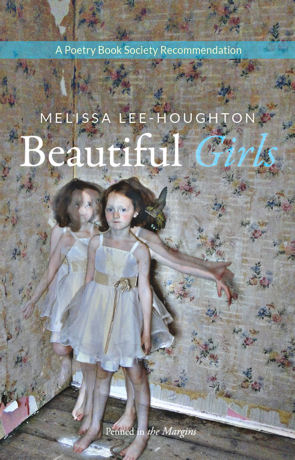 Half truth, half dare, Melissa Lee-Houghton’s second collection, Beautiful Girls, carries you through a landscape of secure hospitals, red light districts and bedrooms where little sleep seems to happen, through adolescent yearnings, childhood dread and adult regrets piled together in a disconcerting, fragile heap that seems likely to topple over at the slightest pressure.
Half truth, half dare, Melissa Lee-Houghton’s second collection, Beautiful Girls, carries you through a landscape of secure hospitals, red light districts and bedrooms where little sleep seems to happen, through adolescent yearnings, childhood dread and adult regrets piled together in a disconcerting, fragile heap that seems likely to topple over at the slightest pressure.
Sinister undertones give way to outright panic, and Lee-Houghton unflinchingly casts grenades in our midst, strewn with lines so tightly wound they may well explode.
In Jade, the opening lines can refer to nothing good: “They called me at three o’clock in the afternoon to tell me/ you’d no longer be able to call me at three o’clock in the morning”.
Couplets like these bound from poem to poem, each so original I want to copy them down, savour their sly promises. (In Sundown by the Abattoir, “Nobody trusts a blue sky./ I am too good to be true and you are too good to be true.” Irresistibly damning.)
These are memories of youth, intense and bitingly vivid, of hope, desire, and heart-rending distress. Melancholy wells through the lines – swollen and at times oddly glorious. Sensuality writhes, as stanzas fasten words tightly between their thighs, in recollections of French kisses “very wet but I wanted to do it all day.” Sliding beside these thoughts come memories of the loneliness of being branded mad – “nobody wanted to touch me/ in case it infected them too.”
Lee-Houghton’s characters are “hyperaware/ and yet preoccupied”, who “don’t need protection”, just faith. They escape from asylums, crave their doctors’ pills and touch with equal hunger and exude a level of vulnerability that’s distinctly alarming.
Explicably (Lee-Houghton has been open about her bi-polar), this is an examination of madness, and our reactions to people with mental illness, yet underneath all that runs the sense of the wildness of youth, the insanity we all teeter on. And while not quite a celebration there’s a hefty hint of satisfaction, of being part of a mythic tribe others can only glimpse as shadows dancing between trees, “See how I shift through time and space, it’s magnificent./ I can be anywhere. This chair, this table;/ a whole week.”
Doesn’t that sound enticing?
Lee-Houghton’s metaphors and similes often catches me by surprise. A boy’s body is “black like the skin of a polar bear”, the residue of drugs is “glitter in his blood”, prayers sit in a heart “like coronary balloons.” Much of her imagery is grotesquely anatomical – horrifying and intoxicating, distressing and alluring all at once.
Above all else, I’m left with the impression of a woman who seeks out pain in order to cherish the sensation of recovery – she believes her daughter will go to a tattoo parlous to have something done “just to feel something healing over.” As though health can’t exist without injury, just as light can’t exist without dark. This is a collection that’s dizzyingly gleeful in all the wrong moments, which is exactly what makes it so right.
Beautiful Girls by Melissa Lee-Houghton is published by Penned In The Margins and is available to buy from Amazon.
To submit or suggest a book review, please send an email to Judy(at)socketcreative.com.
